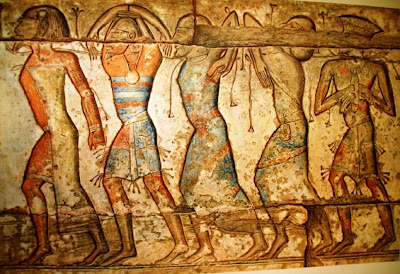The Other-Siders: On being a Hebrew - Torah portion Miketz
 Joseph's brothers are asked to dine at his house. The Egyptians in Joseph's house eat separately, and the Torah tells us why:
Joseph's brothers are asked to dine at his house. The Egyptians in Joseph's house eat separately, and the Torah tells us why:"The Egyptians could not eat bread with the Hebrews, because it was abhorrent to the Egyptians." (Gen 43:32)What was abhorrent about it? We find out later that shepherds are abhorrent to the Egyptians (46:34). Commentators such as Rashi say that this is because the animals being shepherded and eaten by the Hebrews - sheep and bulls - are Egyptian gods. However, we have evidence that at least some subset of Egyptians ate beef and mutton, and the Torah itself speaks about Pharaoh (i.e. the Kingdom of Egypt) possessing livestock (47:6). So there may be more to this issue than meets the eye, and I think I'll leave it to the Egyptologists and other scholars to sort that one out.
At any rate, the Torah describes a taboo among Egyptians against co-mingling with Hebrews. The Hebrew experience, at least in Egypt, is decidedly that of the "other," the outsider. Which incidentally is built into the term "Hebrew" itself.
An Ivri (Hebrew) means a descendant of Ever (Eber), great grandson of Shem. From the root avar, it implies being from, or moving to, the "other side." The first person the Torah describes as a Hebrew is Abraham (Gen 14:13), who migrates from Mesopotamia to Canaan - the "other side" of the river Euphrates.
In the Neo-Assyrian and Persian Achaemenid empires, the tax district west of the Euphrates was known as Eber Nari (Avar Nahara in Hebrew, see e.g. Ezra 10:6), meaning, "the other side of the river." Mesopotamia was "here," on this side, and the communities to the west were "there," on the other side.
So the Hebrews are "other-siders" from a variety of angles. They're not Mesopotamians geographically, having moved from there, nor in mindset, having their own culture and beliefs. They're not Canaanites, but Mesopotamian immigrants. And not only are they foreigners among the Egyptians, but they're abhorred for being shepherds.
To a large degree, this characterizes much of the Jewish experience, certainly in the diaspora. We're other-siders. We're used to feeling like "guests" in our own homes. When we've been expelled or fled from our countries of birth, the tragic reality is that too often we've had nowhere to go, nowhere to call home. Even in the modern-day State of Israel, we're often told by people opposed to our presence to "go back" to Europe or North Africa - places we fled or were forced out of.
Without question, being an other-sider is a significant feature of the Jewish psyche. It can be unsettling and painful, but I'd argue that it also offers some distinct advantages. Possessing a certain outsider viewpoint on things imparts people with perspective. It's a bit like a cinematographer watching a film, as opposed to a regular movie-goer. A cinematographer almost can't help but analyze the film, in addition to (or instead of) simply experiencing it. In so doing, they'll notice things the rest of us are unconscious of, being wholly wrapped up in the plot.
Yes, there's a place for in-the-moment experience, being present rather than analyzing. But there's also a place for the "Hebrew" in us. It helps us to see differently, to take stock on where we're at, where society is at. It lends perspective on norms we otherwise take for granted, prompts us to think outside the box, and to look for new ways to improve things. Being other-siders causes us to step outside of ourselves, to engage in self-critique and self-correction. It's no doubt a key ingredient for so many individuals who go on to achieve greatness.
Of course, the same other-sider mentality can also cause people to become insular, to fear, vilify and blame the outside, and to overlook and downplay their own faults. It's something that can consume a person, or a culture, if they're not careful. So we need to use our "other-sidedness" judiciously, with the intent to become more conscious, more incisive, more imaginative and creative.
The truth is, everyone has a little "Hebrew" in them. We all know what it feels like to be left out, not be one of the gang. It's the pain of being an other-sider, but a pain which comes with the gift of perspective, and ultimately the promise of conscious advance. So if you ever find yourself feeling like the other, use it - embrace it, learn from it, and help the rest of us gain from your perspective.



Comments
Post a Comment
Not sure how to leave a comment? By "Comment as", either choose your Google ID, OR select "Name/URL". Type your name and leave URL blank (if you don't have a web address). Then hit "Publish", type in the letters/number shown, and again "Publish". I don't mind anonymous comments, but please use a pseudonym.